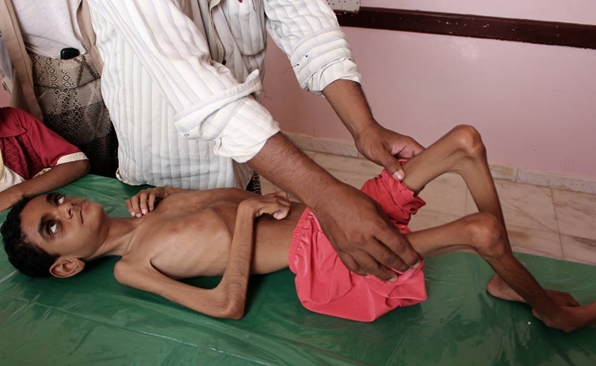After Five Years of War, How Will Yemen Face Corona?
YemenExtra
With the fifth anniversary of starting to love Yemen, the United Nations announces the need of more than two-thirds of Yemenis of clean water.
UNICEF also says that 18 million people, including 9.2 million children in Yemen, do not have direct access to “safe water, sanitation and hygiene”. It portends a health disaster in the event of an outbreak of corona in the country.
After five years of the Saudi war on Yemen, the country is witnessing a collapse in its health sector. Health experts are reiterating advice to wash hands with soap and water as a way to prevent the emerging coronavirus, which is currently spreading in the world, but how can millions of Yemenis do so amid severe water scarcity?
In Yemen, where the worst humanitarian crisis in the world has been recorded, there is no infection yet of the Coronavirus, according to the World Health Organization. However, there is great fear that the epidemic, if it reaches the poorest countries of the Arabian Peninsula, can cause a human catastrophe.
After five years of the Saudi war on Yemen, the country is witnessing a collapse in its health sector, while more than 3.3 million displaced people live in schools and camps. This is where diseases such as cholera are spread due to the scarcity of clean water.
Caroline Siegen, the director of “Doctors Without Borders” projects in Yemen, Iraq and Jordan, says that Yemenis “cannot get clean water, and some cannot even get soap.”
“We can recommend hand washing, but what if you don’t have anything to wash your hands with?” she asked. “We are already seeing a catastrophe in Europe where we are supposed to have the best health systems in the world, and in Yemen we know that there is a (health) system collapsing, and many of the camps for the displaced are suffering from a lack of personal hygiene and clean water,” Siegen said.
As the Saudi-led war on Yemen enters its sixth year, UNICEF says that 18 million people, including 9.2 million children in Yemen, do not have direct access to “safe water, sanitation and hygiene.”
For his part, UNICEF Director of Communications in Yemen, Bismark Swangin, states that “access to drinking water has been severely affected by years of underinvestment in water and sanitation systems and the ongoing conflict that has wiped out water systems.”
Only a third of Yemen’s 27 million people are connected to water pipeline systems, according to Swangin, who stresses that “access to clean water is critical to preventing the spread of water-borne diseases.”
Cholera and other diseases
Thousands of civilians have been killed in the poor country since the start of the Saudi “coalition” operations on March 26, 2015. The country’s health sector collapsed, amid severe drug shortages and the spread of diseases such as cholera, which caused hundreds of deaths, at a time when millions of people are at risk of starvation.
Scarcity of clean water contributed to the Cholera outbreak. Cholera is an intestinal infection caused by germs traveling in unclean water. The disease has a cure, but the delay in obtaining it may result in death. In Al-Jada Medical Center in Haradh, Hajjah Governorate, emergency doctor Muhammad Aqil affirms that the center deals daily with about 300 cases. He indicates that most of the cases that come to the center are mostly “related to diseases transmitted due to the non-drinking water.”
In 2017, Yemen suffered the largest outbreak of cholera and acute diarrhea in the world as it killed more than 2,000 people.
Last Tuesday, “Oxfam” warned that the coming rainy season may witness a new wave of cholera, which could worsen dramatically in light of the threat of the emerging Coronavirus.
“After five years of death, disease and displacement, and in the face of a growing threat from a global pandemic, Yemenis desperately need the agreement of all warring parties of an immediate ceasefire,” Mohsen Siddiqui, the organization’s regional director, said.
“A disaster”
The prospect of a new Corona epidemic heralds a catastrophe for the health sector that has collapsed due to the years of war, according to MSF.
“Frequently washing of hands is said to be the most prominent preventive measure for the Coronavirus. What do more than half of the Yemeni people, who lack access to safe water, do?” the International Committee of the Red Cross wrote on Twitter.
The Sana’a government has begun preventative preparations, including the closure of schools and the suspension of United Nations flights that land in Sana’a. Meanwhile, the procedures have appeared less in the south of the country, which is controlled by the forces loyal to the coalition.
The World Health Organization in Yemen stresses that “the fragile health system can no longer be overburdened in Yemen,” noting that “the disease entering Yemen will burden hospitals and health facilities.”
In the same context, the United Nations announced the need for more than two-thirds of Yemenis to clean water, stressing the need to provide it to prevent cholera and the “emerging corona” epidemic.
“More than two-thirds of the Yemeni population needs support to secure water, especially the internally displaced people who stay in camps and spend hours a day getting water,” UNHCR said in a tweet on its Twitter account.
“Providing clean, safe water is an urgent necessity and it contributes to the prevention of diseases such as cholera and coronavirus,” UNHCR added.

